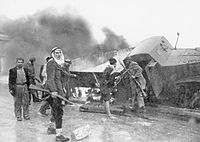
Photo from wikipedia
Community archaeologies should emerge from an awareness of the ways in which archaeological praxis is embedded with multiple pasts, subjectivities, materialities, and national and transnational histories. This longitudinal archaeological ethnography… Click to show full abstract
Community archaeologies should emerge from an awareness of the ways in which archaeological praxis is embedded with multiple pasts, subjectivities, materialities, and national and transnational histories. This longitudinal archaeological ethnography explores the lived experiences, perceptions of the past, and relationship to archaeology and archaeologists amongst villagers residing near the Kerkenes site in Turkey after attempts by the project to develop heritage awareness, a sustainable local economy, and collaborative management of the site within the community. However well-intentioned, considerable challenges to closing the gap in understanding between archaeologists and locals can arise when the efforts of archaeologists become entangled in larger socio-political frameworks beyond their control. Villagers have experienced being dehumanized as Muslim migrant workers in Europe and were Islamic-based nationalist supporters of the conservative Erdoğan regime. The archaeologists’ heritage-making practices inadvertently triggered symbolic associations of the project with the colonial endeavor. Locals produced counter-narratives about the site as a decolonizing response.
Journal Title: Journal of Social Archaeology
Year Published: 2022
Link to full text (if available)
Share on Social Media: Sign Up to like & get
recommendations!